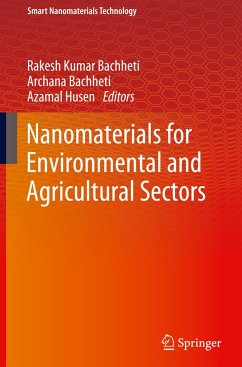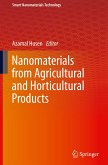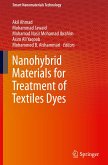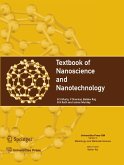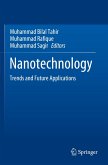Nanomaterials for Environmental and Agricultural Sectors
Herausgegeben:Bachheti, Rakesh Kumar; Bachheti, Archana; Husen, Azamal
Nanomaterials for Environmental and Agricultural Sectors
Herausgegeben:Bachheti, Rakesh Kumar; Bachheti, Archana; Husen, Azamal
- Gebundenes Buch
- Merkliste
- Auf die Merkliste
- Bewerten Bewerten
- Teilen
- Produkt teilen
- Produkterinnerung
- Produkterinnerung
This book gives a complete overview of current developments in nanotechnology-based environmental remediation and sustainable agriculture practices/sectors. It will provide the use of nanotechnology in the agricultural sector such as crop production and improvement, soil fertility management along with benefits and risks of nanotechnology on ecological farming. Additionally, the book also discovers how nanotechnology is used in water, air remediation techniques and major challenges in using nanomaterials for improving water and air quality. The book can be a reference source for academicians,…mehr
Andere Kunden interessierten sich auch für
![Nanomaterials from Agricultural and Horticultural Products Nanomaterials from Agricultural and Horticultural Products]() Nanomaterials from Agricultural and Horticultural Products131,99 €
Nanomaterials from Agricultural and Horticultural Products131,99 €![Nanohybrid Materials for Treatment of Textiles Dyes Nanohybrid Materials for Treatment of Textiles Dyes]() Nanohybrid Materials for Treatment of Textiles Dyes123,99 €
Nanohybrid Materials for Treatment of Textiles Dyes123,99 €![Textbook of Nanoscience and Nanotechnology Textbook of Nanoscience and Nanotechnology]() B. S. MurtyTextbook of Nanoscience and Nanotechnology127,99 €
B. S. MurtyTextbook of Nanoscience and Nanotechnology127,99 €![Textbook of Nanoscience and Nanotechnology Textbook of Nanoscience and Nanotechnology]() B. S. MurtyTextbook of Nanoscience and Nanotechnology90,99 €
B. S. MurtyTextbook of Nanoscience and Nanotechnology90,99 €![Nano Metal Oxides Nano Metal Oxides]() B. KarthikeyanNano Metal Oxides100,99 €
B. KarthikeyanNano Metal Oxides100,99 €![Nano Metal Oxides Nano Metal Oxides]() B. KarthikeyanNano Metal Oxides100,99 €
B. KarthikeyanNano Metal Oxides100,99 €![Nanotechnology Nanotechnology]() Nanotechnology70,99 €
Nanotechnology70,99 €-
-
-
This book gives a complete overview of current developments in nanotechnology-based environmental remediation and sustainable agriculture practices/sectors. It will provide the use of nanotechnology in the agricultural sector such as crop production and improvement, soil fertility management along with benefits and risks of nanotechnology on ecological farming. Additionally, the book also discovers how nanotechnology is used in water, air remediation techniques and major challenges in using nanomaterials for improving water and air quality. The book can be a reference source for academicians, scientists, policymakers, students, and research scientists working in minimizing the environmental pollution and increasing agricultural production using nanoparticles.
Produktdetails
- Produktdetails
- Smart Nanomaterials Technology
- Verlag: Springer / Springer Nature Singapore / Springer, Berlin
- Artikelnr. des Verlages: 978-981-99-2873-6
- 2023
- Seitenzahl: 288
- Erscheinungstermin: 22. Juli 2023
- Englisch
- Abmessung: 241mm x 160mm x 22mm
- Gewicht: 600g
- ISBN-13: 9789819928736
- ISBN-10: 9819928737
- Artikelnr.: 67760085
- Herstellerkennzeichnung Die Herstellerinformationen sind derzeit nicht verfügbar.
- Smart Nanomaterials Technology
- Verlag: Springer / Springer Nature Singapore / Springer, Berlin
- Artikelnr. des Verlages: 978-981-99-2873-6
- 2023
- Seitenzahl: 288
- Erscheinungstermin: 22. Juli 2023
- Englisch
- Abmessung: 241mm x 160mm x 22mm
- Gewicht: 600g
- ISBN-13: 9789819928736
- ISBN-10: 9819928737
- Artikelnr.: 67760085
- Herstellerkennzeichnung Die Herstellerinformationen sind derzeit nicht verfügbar.
Rakesh Kumar Bachheti graduated from the Hemwati Nandan Bahuguna University, Garhwal, India, in 1996. He completed his MSc in Organic Chemistry from Hemwati Nandan Bahuguna University, Garhwal, India, in 1998. He had undergone a one-year Post Graduate Diploma in Pulp and Paper Technology from Forest Research Institute, Dehradun, in 2001. He obtained his Ph.D. in Organic Chemistry from Kumaun University, Nainital, India, in 2007. He is presently working as an Associate Professor of Organic Chemistry in the Department of Industrial Chemistry at the Addis Ababa Science and Technology University (AASTU) of Ethiopia, where he teaches Ph.D., graduate, and undergraduate students. Before joining AASTU, Rakesh was working as Dean Project (Assistant) at Graphic Era University (A grade university by NACC) in Dehradun, India. Rakesh also presented papers at various international (Malaysia, Thailand, and India) and national conferences. He was also a member of various important committees, such as the Internal Quality Assurance Cell (IQAC), Anti-ragging committee. His major research interests include natural products for Industrial application, biofuel and bioenergy, green synthesis of nanoparticles, their application and Pulp and paper technology. He retains a fundamental love for natural products, which permeates all of his research. He has also successfully advised 30 MSc and 3 Ph.D. students to completion, and countless undergraduates have researched in his laboratory. Dr. Bachheti is actively involved in curriculum development for BSc/MSc/Ph.D. programs. Dr. Bachheti is an editor of 4 books and 70 publications, dealing with various aspects of natural product chemistry and nanotechnology and has twenty book chapters published by Springer, Elsevier, and Nova Publisher. Presently, he is supervising 5 Ph.D. students and 2 Master's students and works on two research projects funded by AASTU. Archana Bachheti did BSc in 1997 and MSc in 1999 from HNB Garhwal University. She received her Ph.D. from Forest Research Institute, Dehradun, India, in 2006. She has carried out research projects and consultancy work in the areas of ecorestoration/ development of wasteland, physico-chemical properties of Jatropha curcus seed oil and their relation with altitudinal variation, and has been a consultant Ecologist to a project funded by a government agency. Dr. Joshi is currently Professor at Graphic Era University, Dehradun, India. She has also served in many capacities in academia within India and provided expertise internationally for more than 15 years. She taught Ecology and Environment, Environmental Science, Freshwater Ecology, Disaster management, and Bryophytes and Pteridophytes. Her major research interests encompass the broad, interdisciplinary field of plant ecology, focusing on ecorestoration, green chemistry, especially the synthesis of nanomaterial, and medicinal properties of plants. The breadth of her research spans from degraded land ecological amelioration and physical and chemical properties of plant oil to plant-based nanomaterial. She guided one Ph.D. student, supervised three scholars, and guided graduate and undergraduate students with their research projects. While the fascination with forest biodiversity captured her interest, it has been her love for the exploration of values of biodiversity and social upliftment through it that has maintained that passion. Dr. Joshi is the editor of 4 books and has published over 55 research articles in international and national journals and sixteen book chapters. She organized several National seminars/conferences at Graphic Era University, India. Azamal Husen served as Professor & Head, Department of Biology, University of Gondar, Ethiopia and is a Foreign Delegate at Wolaita Sodo University, Wolaita, Ethiopia. Earlier, he was a Visiting Faculty of the Forest ResearchInstitute, and the Doon College of Agriculture and Forest at Dehra Dun, India. His research and teaching experience of 20 years involves studies of biogenic nanomaterial fabrication and application, plant responses to environmental stresses and nanomaterials at the physiological, biochemical and molecular levels, herbal medicine, and clonal propagation for improvement of tree species. He has conducted several research projects sponsored by various funding agencies, including the World Bank (FREEP), the National Agricultural Technology Project (NATP), the Indian Council of Agriculture Research (ICAR), the Indian Council of Forest Research Education (ICFRE); and the Japan Bank for International Cooperation (JBIC). He received four fellowships from India and a recognition award from the University of Gondar, Ethiopia, for excellent teaching, research, and community service. Husen has been on the Editorial board and the panel of reviewers of several reputed journals published by Elsevier,Frontiers Media, Taylor & Francis, Springer Nature, RSC, Oxford University Press, Sciendo, The Royal Society, CSIRO, PLOS, MDPI, John Wiley & Sons and UPM Journals. He is on the advisory board of Cambridge Scholars Publishing, UK. He is a Fellow of the Plantae group of the American Society of Plant Biologists, and a Member of the International Society of Root Research, Asian Council of Science Editors, and INPST. To his credit are over 200 publications; and he is Editor-in-Chief of the American Journal of Plant Physiology. He is also working as Series Editor of 'Exploring Medicinal Plants', published by Taylor & Francis Group, USA; 'Plant Biology, Sustainability, and Climate Change', published by Elsevier, USA; and 'Smart Nanomaterials Technology', published by Springer Nature Singapore Pte Ltd. Singapore.
Role of silver nanoparticles on wastewater treatment, environmental implications, and challenges.- Role of nanoparticles in air quality monitoring with respect to toxicity, virus detection and gas sensing.- Past, Present and Possible Future Application of Nanoparticle in Contaminated Soil Remediation.- Development Strategies and Prospects of Carbon Nanotube as Heavy Metal Adsorbent.- Recent development and importance of nanoparticle in disinfection and pathogen control.- Recent advances in nanoparticles for environmental monitoring and sensing: An overview.- Current trends and future applications of silica nanomaterials in adsorption and catalysis.- Effect of nanofertilisers on plant physiology, metabolism and associated safety issues.- Benefits, future prospective and problem associated with use of nanopesticides.- Current applications and future perspectives of nanotechnology for the preservation and enhancement of grain and seed traits.- Interaction between metal oxide nanoparticlesand PGPR on plant growth and development.- Recent application and future prospects of nanoparticles-based colorimetric sensors for residual pesticides detection.- Applications, Opportunities and Challenges of Nanotechnology in the Food Industry.
Role of silver nanoparticles on wastewater treatment, environmental implications, and challenges.- Role of nanoparticles in air quality monitoring with respect to toxicity, virus detection and gas sensing.- Past, Present and Possible Future Application of Nanoparticle in Contaminated Soil Remediation.- Development Strategies and Prospects of Carbon Nanotube as Heavy Metal Adsorbent.- Recent development and importance of nanoparticle in disinfection and pathogen control.- Recent advances in nanoparticles for environmental monitoring and sensing: An overview.- Current trends and future applications of silica nanomaterials in adsorption and catalysis.- Effect of nanofertilisers on plant physiology, metabolism and associated safety issues.- Benefits, future prospective and problem associated with use of nanopesticides.- Current applications and future perspectives of nanotechnology for the preservation and enhancement of grain and seed traits.- Interaction between metal oxide nanoparticlesand PGPR on plant growth and development.- Recent application and future prospects of nanoparticles-based colorimetric sensors for residual pesticides detection.- Applications, Opportunities and Challenges of Nanotechnology in the Food Industry.

